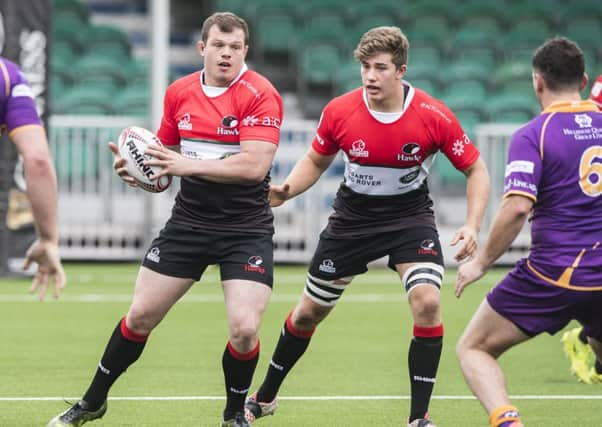Hawks face uncertain future as Glasgow misses out on Super 6


A press conference will be held at BT Murrayfield this lunchtime, with representatives from all six successful clubs – Ayr, Melrose, Heriot’s, Boroughmuir, Watsonians and Stirling County – facing the media after what is undoubtedly a momentous revamp of Scottish club rugby.
Led by its bullish chief executive Mark Dodson, pictured, the SRU has driven forward with its plan to create a new tier of part-time professional clubs, funded mainly by the union, and yesterday’s announcement threw up a couple of surprises.
Advertisement
Hide AdAdvertisement
Hide AdThe main one was the failure of Glasgow Hawks to be included and the decision instead to have three clubs from Edinburgh.
It was always going to be the case that the main consequences of the new era would be felt by those left out and facing a future in what will now be a strictly amateur set-up below the Super 6.
Dire consequences for Hawks it would seem, going by the noises emanating from the Anniesland club, who suggest there is a real threat that it signals the end of the club. Formed in 1997 after the merger of Glasgow Academical and GHK, the club had grand plans to flourish two years after rugby went professional.
Those ambitions were checked as the SRU opted to forge into the pro era down a district route, but Hawks continued to be a major player on the club scene and were Scottish champions three seasons running between 2003-04 and 2005-06.
Hawks proved a good breeding ground for young players and coaches, such as Shade Munro and Peter Wright, while also providing a platform for Glasgow Warriors pros to get Premiership game time, a notable recent example being scrum-half George Horne.
Hawks president Kenny Hamilton said yesterday: “We were quite innovative and entrepreneurial in our day but, for whatever reason, our bid has not been enough.”
There is a suspicion that the issue of a ground counted against the Hawks bid. With Anniesland unavailable as it is owned by Kelvinside Academy, the plan was to use West of Scotland’s Burnbrae, which has an artificial pitch but no stand next to it.
The main thrust of Hawks’ frustration is the fact that Glasgow has been overlooked, while Edinburgh has been awarded three. The views of all 12 of the applicants, successful and unsuccessful, were included in the SRU-controlled statement to announce the winning bids.
Advertisement
Hide AdAdvertisement
Hide AdOf the losing clubs, the Hawks one was the most strongly worded.
“It is profoundly disappointing that Scotland’s biggest city will not be represented in this new structure,” it said. “The commitment offered by Glasgow and Strathclyde Universities, The Royal Navy in Scotland and three long-established rugby clubs did not find favour on this occasion.
“It is our earnest hope that the goodwill of these organisations might be harnessed by an alternative body to ensure that the City of Glasgow has a platform for the best available club talent to develop in a professional environment.”
Elsewhere, the inclusion of Boroughmuir was a surprise and there was also acute disappointment for Currie and Edinburgh Accies, who had been growing in confidence that they could get the nod in the capital.
Dodson, meanwhile, said: “At the outset I’d like to thank everyone associated with the 12 applicants who worked so hard to put forward a fantastic selection of bids. It was a great response and evident that a great deal of time and effort had been put into them.
“Given we had double the number of bids for the places available in Super 6, inevitably some of the applicants would lose out. The Review Panel gave each bidder a full, fair and equal opportunity to make their case. The six successful applications will, I believe, enable Super 6 to achieve our ambition to raise the standard of rugby at the top of the club game in Scotland and also create strong, sustainable franchises in their own right.
“This is the start of our Super 6 journey together and I feel we are well-placed to make it a success.”